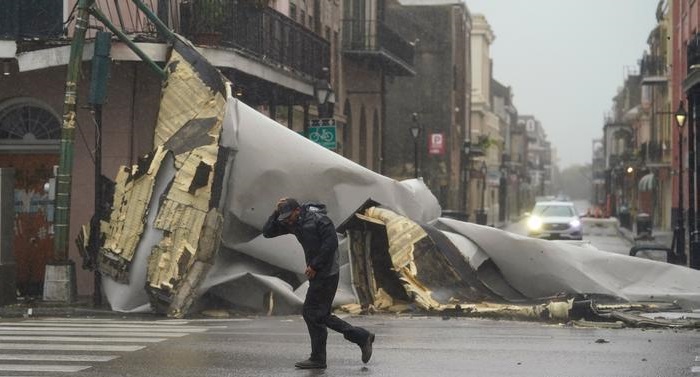
Hurricane Ida wreaked havoc in Louisiana on Sunday, causing extensive damage in the Gulf Coast region and leaving thousands without power.
At least one person was reported to have died on Sunday after being hit by a falling tree, a local Sheriff's office announced.
What's the latest on the storm?
All of New Orleans was left without power as the hurricane left "catastrophic transmission damage" in its wake, according to Entergy New Orleans, the electric and natural gas utility that serves the city.
The only power in the city came from generators, the Office of Homeland Security and Emergency Preparedness said in a tweet.
"Catastrophic storm surge, extreme winds, and flash flooding continue in portions of southeastern Louisiana," the Miami-based National Hurricane Center (NHC) said in an update on the hurricane.
The NHC downgraded Ida to a tropical storm on Monday morning as it passed over southwestern Mississippi, 16 hours after making landfall, with maximum sustained winds of 60mph (95 kmph). This was down from the maximum sustained winds of 130 mph (209 kmph) recorded just a few hours after making landfall.
Experts forecast that it would continue to weaken throughout Monday morning.
The city of New Orleans was under a flash flood warning, with the storm causing damage to buildings in the historic French Quarter.
In other parts of the state, NBC New Orleans anchor Christina Watkins tweeted the storm also blew off part of a roof of a hospital in the southern Louisianan town of Galliano.
The damage to the hospital comes as the state grapples with a surge in coronavirus cases, making it more difficult for health authorities to respond to the ongoing pandemic.
The power outage tracking website poweroutage.us showed over 1 million people in Lousiana had been left without electricity by Monday morning.
Another video shared on Twitter showed winds and rain blowing around a large building in New Orleans.
Biden vows federal support for hard-hit areas
President Joe Biden visited the Federal Emergency Management Agency headquarters in Washington, D.C. on Sunday, where he promised assistance for areas heavily impacted by Ida.
Biden said federal support in the Gulf Coast region would remain "for as long as it takes."
"I want to make sure that we're ready to surge all the response capacity, capability that we have to deal with whatever comes next, and a lot's going to be coming," Biden said while meeting with FEMA administrator Deanne Criswell.
The president said it may take weeks for power to be restored to some hard-hit areas.
Louisiana Governor John Bel Edwards tweeted Sunday that "current weather conditions" in the state are "only the very beginning of what's to come," as the storm only recently made landfall. He called on Louisiana residents to stay sheltered in place and to remain indoors.
During a press conference, Edwards said first responders will be unable to answer search and rescue calls until early Monday due to the storm.
The strength of Hurricane Ida has drawn comparisons to Hurricane Katrina, which devastated New Orleans in 2005. The storm killed over 1,800 people and caused millions of dollars in damage, with FEMA's emergency response being heavily scrutinized at the time.